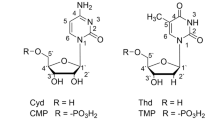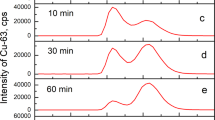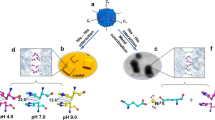Abstract
STABILITY constants are known for copper complexes of most of the naturally occurring α-amino-acids. However, although it is of considerable biochemical interest, the copper–histidine system has not been interpreted in detail. The system is anomalous, probably because, although the metal can co-ordinate to the amino, imidazole or carboxyl groups in histidine, an assumed planar configuration of the cupric complexes allows only two sites in any histidine molecule to be bound simultaneously1. In this way both the histidine anion (L−) and the zwitterion (HL+−) can act as chelating species, giving the five different complexes, CuL+, CuHL++, CuL2, CuHL2+ and Cu(HL)2++. Because the concentration ratio of L− to HL+− is dependent on pH, the proportions of the complexes present will vary with both ligand concentration and pH.
This is a preview of subscription content, access via your institution
Access options
Similar content being viewed by others
References
Albert, A., Biochem. J., 50, 690 (1952).
Leberman, R., and Rabin, B. R., Nature, 183, 746 (1959).
Author information
Authors and Affiliations
Rights and permissions
About this article
Cite this article
PERRIN, D. Histidine-Copper (II) Complexes. Nature 184, 1868–1869 (1959). https://doi.org/10.1038/1841868a0
Issue Date:
DOI: https://doi.org/10.1038/1841868a0
This article is cited by
Comments
By submitting a comment you agree to abide by our Terms and Community Guidelines. If you find something abusive or that does not comply with our terms or guidelines please flag it as inappropriate.



